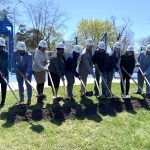Another Mistake on the Lake?
Last night, WUWM hosted Project Milwaukee: Creating a Vibrant Regional Economy, a forum of nine influential local figures responding to questions from the moderators, the audience and website visitors about the challenges facing Greater Milwaukee. All of the hot-button issues were trotted out in a drive-by hour-and-a-half – transportation, education, the economy, crime, race, poverty, “brain drain” – with barely a raised voice or interruption and no threat of fisticuffs. An informative – if not momentous – program, indeed.
The facts are on the table, Milwaukee: you’re a pretty great city, and most people seem to like you a lot. But you have some seriously ugly moles on your face that are going to get malignant if you don’t freeze them off right quick. Statistics released in October confirm our deepest fear: we have the second-highest black male poverty rate in the country, next to PITTSBURGH, at a punch-in-the-stomach 43%. We have one of the worst public school graduation rates in the country, in a list that includes CLEVELAND. And you’re going to hate this: of the 50 largest cities in the United States, our unemployment rate is the second highest. Number one?
DETROIT.
The forum lacked a sense of alarm, and it lacked compelling vision for addressing the city’s problems – indeed, at times panelists outright, glass-half-full, golly-gee denied that there were any problems. Maybe that wasn’t the point of Project Milwaukee, anyway; maybe it was imagined as an exploratory, low-stakes roundtable. Still, there were so many moments in the discussion that made me want to stand up and yell: when Rocky Marcoux suggested that segregation and poverty in the city would be alleviated as well-off suburbanites buy condos and move downtown (that’s not a solution; that’s called “gentrification,” thanks very much), or that the new Marquette Interchange was an example of a laudable transportation initiative (as opposed to adding bus routes, lowering fares, thinking out of the box about better public transportation, or moving forward with regional public transit); when Ricardo Diaz, executive director of the United Community Center, countered a question about racial hatred by insisting that Hispanics on the city’s south side are well-educated, employed, financially stable, happy, safe, bustling and “95% undocumented” – and apparently not at all affected by racial issues, which has become a fancy way of saying “black.”
I moved to Milwaukee for a number of reasons, some incidental, some emotional, some very precise. I wanted to stay in the Midwest, near Detroit and my big Detroit family; I wanted to stay immersed in the cold, the rust, the brick buildings, the staunch characters, tough immigrant attitudes and northern charm that are part of me and put me at ease. I wanted to be in a city, a big city with lots to do and see, populated with exciting young people and interesting ideas, but a city that was small enough to get around on foot, on bike or by bus, a city where I could get to know my neighbors and make a place for myself in the community. I already knew I loved Wisconsin, where there is fresh air, fresh food and lots of space, where in 30 miles, the city gives way to grassy prairies, big lakes and low, wide skies. I wanted to live in a beautiful place, a place that respected its history and tended to its past, a place with well-loved parks and a waterfront. I wanted to live somewhere laid-back, where I could find a gratifying job without scrambling to bleed out the competition, where I could make rent every month without starving or selling out.
I looked into so many places: New Orleans; Washington, D.C.; Portland, OR; Montana; even Detroit’s central city. But Milwaukee was a good fit, and it has been so good to me. I was head-over-heels for Milwaukee for the first year or so of my life here, and now that infatuation has mellowed out into the comfortable, warm sensation of being at home.
Much of Thursday’s discussion about making Milwaukee appealing to us young movers-and-shakers focused on how to make Milwaukee more like the cities we are so attracted to – Portland, Seattle, Minneapolis, Atlanta. But the key to hearts and minds is not green initiatives (necessary though they are), more art galleries, a funkier night life or an Urban Outfitters. Mayor Kwame Kilpatrick and Governor Jennifer Granholm tried that in Detroit with the “Cool Cities” campaign, a failed attempt to sex up Michigan’s image and keep disenchanted college graduates at home, which mostly involved the two politicians wearing sunglasses and sounding out of touch.
Then fight with your teeth bared. This is no time to talk about how to get hip. We need to grow a local economy, we need to desegregate, we need better public transportation. An attractive, livable, vibrant city with an identity that is its own – not modeled after a city we’re jealous of like Chicago, not a condo jungle, not a flashy downtown mock-up that masks a far darker, more desperate reality – will grow organically from safe neighborhoods with smart leaders, educated people that care about their communities and fearless, inspired initiatives that promote communication, transportation, environmental responsibility and a healthy, stable economy. Big words, but high stakes: what if Milwaukee were another Mistake on the Lake?
Project Milwaukee will air on WUWM’s Lake Effect this Monday, November 19, from 10 – 11 am. Give it a listen online, see what you think, and share your thoughts, with me or with anyone else.















